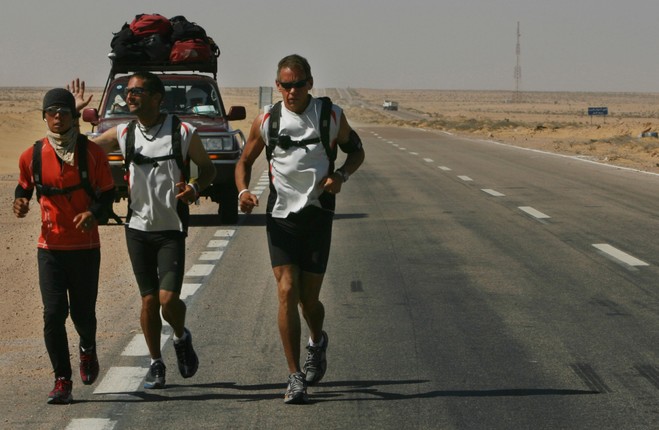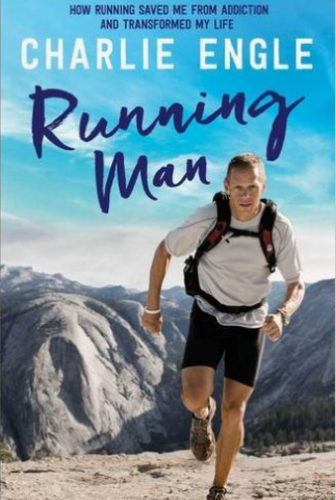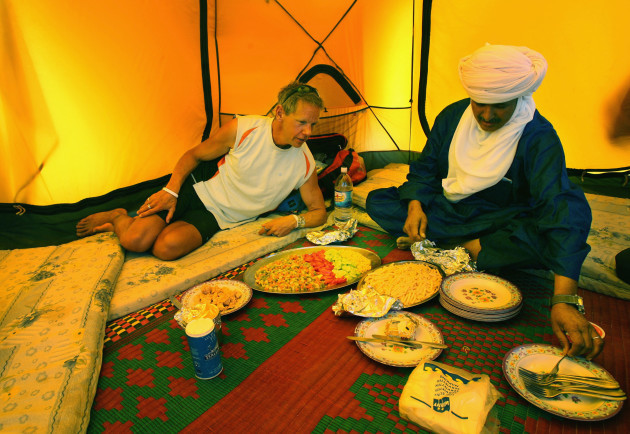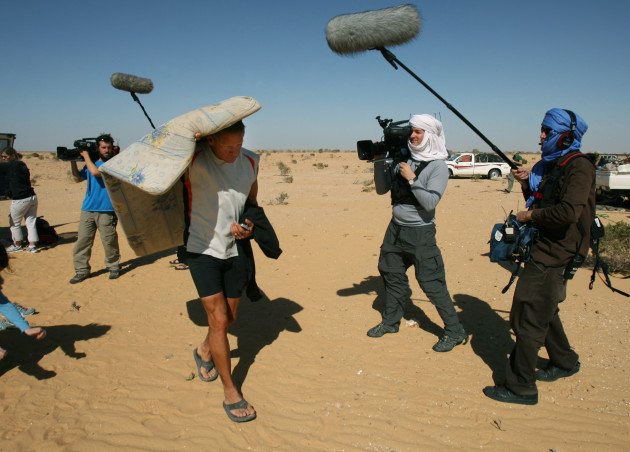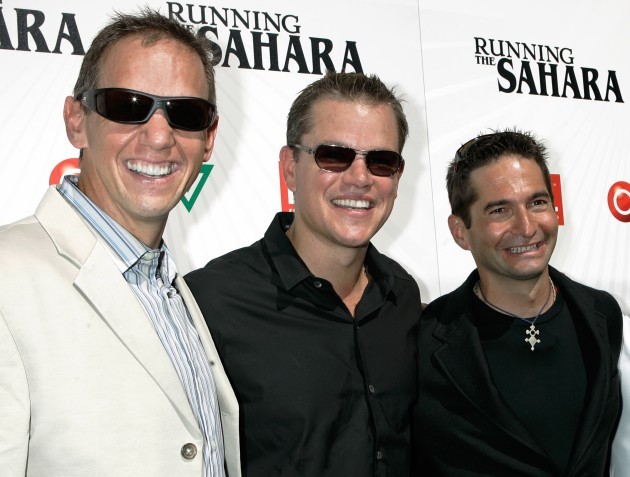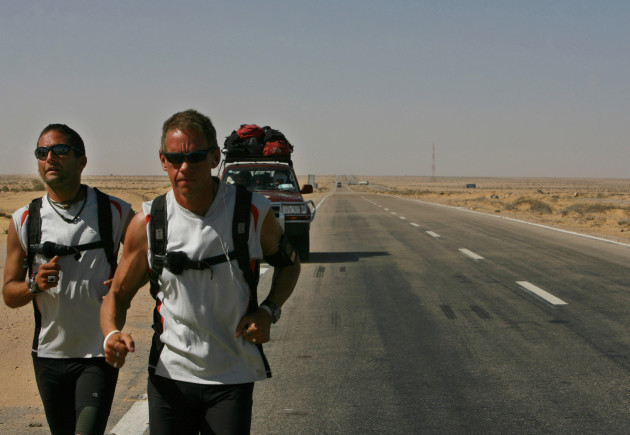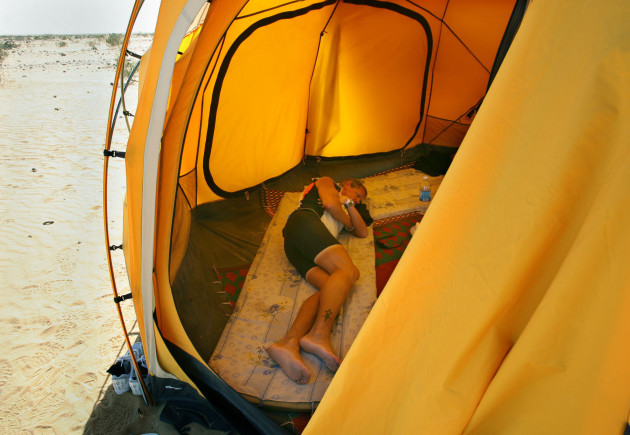IF ANYONE’S LIFE warrants being turned into a book, it’s Charlie Engle’s.
The 53-year-old is primarily known as one of the world’s top ultramarathon runners, and as his new book Running Man shows, his story contains countless highs and lows even by athletes’ standards.
Having experimented with drugs and alcohol as a youngster, Engle’s addiction eventually spiralled out of control.
For a decade, he was addicted to crack cocaine, and after numerous failed attempts to resolve his issues, a near-fatal incident amid a hail of bullets finally prompted him to get sober.
Following this dark period, Engle, having always been passionate about running, began to challenge himself in new and equally arduous ways.
He became involved in ultramarahon running and travelled the world as he sought to test himself in a variety of different locations.
The North Carolina native drew plenty of acclaim and attention, in particular, after undertaking a record-breaking 4,500-mile run across the Sahara Desert — a feat that was recorded in the Matt Damon-produced documentary Running the Sahara and which ultimately raised millions of dollars for charity.
Yet following these heroics, Engle’s life again took a turn for the worse. His growing fame prompted an investigation and subsequent conviction for mortgage fraud in 2010. Despite Engle and others maintaining his innocence, he would ultimately spend 16 months in a federal prison in Berkley, West Virginia
Ultimately, Engle’s story is one of endurance in many senses, and of overcoming life’s setbacks thanks to the support of family and friends and his own iron willpower. It is a story of redemption through running and of learning from the bleakest of moments in order to emerge as a stronger and better human being.
Recently, Engle spoke to The42 about his turbulent and remarkable life story.
As a sidenote, he also revealed his Irish heritage: “I’m not a big genealogy person, but I am about 90% Irish. I recently got documentation that found I am fourth generation. My family came over in the late 1800s.
“Unfortunately, I don’t know from where yet. I know how important the regions of Ireland are, but I don’t know my information well enough yet.
“I was one of those people who went through life not really knowing where I was from, but at a recent family reunion, there was some documentation, which showed beyond a shadow of a doubt (that I had an Irish background).
“My great, great grandfather was the first one to come over and he brought his entire clan. All the information I have my genealogy proves that my roots were 100% in Ireland, but I don’t know if you guys want to claim me or not, but you’re welcome to.”
So tell us, what made you want write this book?
If you do enough things in life and have enough things happen to you, then sooner or later someone will suggest it.
The real inspiration behind the book is the desire to share one simple fact. No matter what happens in life to me or to anyone, all that matters is how we use that in our lives.
I guess it doesn’t matter what happens to you. It matters what you do with what happens.
I think that that’s the message that’s conveyed in this book. I’ve put myself in some crazy difficult positions and then I’ve also had some things happen to me that were no fault of my own. I’d like to think that I responded to all of those things in the same fashion, which is just to move forward before we progress and try to move past good and bad things equally.
What attracted you to running in the first place?
Number one, as a sport, I wasn’t very good at anything else. The first sport I played was soccer, your ‘football,’ and I just wasn’t very good. Then I tried basketball and baseball and all of the traditional sports. I was as tall as I am know, which is basically six feet tall, as a 12-year-old. I weighed 120 pounds and I was just terrible at every sport, but when I put on running shoes, finally (everything clicked into place).
I went out for football. The track coach saw me running and said to come out for his team. I showed up the next day in my football cleats and I’ve never stopped running since. As a child, it was the one thing I was good at. But maybe, more importantly, I did understand the feeling that it gave me. The feeling of freedom and being able to go wherever I wanted to go on foot. It stuck with me from the very early days.
Tell us a bit about your upbringing. It seemed quite unstable at times. There was a significant amount of moving around to different places. For many artists, writers and musicians, and generally creative people, a lot of them have in common the fact that they moved around a lot during their childhoods. Do you think that was a big influence in making you become the person you became?
You’re absolutely correct. I was an only child. I like to say that with my mother I was lovingly neglected.
She was a young mother and she had her own love. She certainly loved me but she also was doing her own thing.
I sort of raised myself in many ways. We moved around every couple of years or even more often and I never fit in anywhere, so I was a child growing up in a very adult world.
Even though I wasn’t running competitively in those days, my focus was to go out the door and run and play, and there was a great freedom in my fantasies also… I certainly was never restricted.
She was not the kind of mom who said: ‘Okay, you have to be in the house at a certain time.’ So consequently, I made my own decisions for better or worse. I think that freedom to do what I wanted, but more importantly to think what I wanted, it really has made me who I am today.
This political season that we’re in right now is a great example. My mother’s a very liberal human being. Generally speaking, as I got older, it would be very clear who she might vote for in a certain election. But she would never say to me: ‘Here’s how you should think and here’s what you should do.’
I think that’s the mistake that so many parents make with their kids and their kids end up being little carbon copies of them. It’s because they’re so deeply impacted by the beliefs of their parents.
With my mother, she was very encouraging of me to understand all sides of an issue and make my own decisions. It was very frustrating as a child. Sometimes I wanted her to say ‘here’s the answer’ and very often, she just said: ‘Here’s what some people believe and here’s what other people believe, and you have to make up your own mind.’
The first part of the book often focuses on your struggles with addiction. One thing you mention about drinking, in particular, is how you felt a sense of relief when you drank. Why was this the case do you think? What were you relieved about?
In my genetic makeup, there’s a long history of addiction and alcoholism in my family. My predisposition, along with being raised in a very flee-flowing environment without a lot of structure, it caused me to feel very unsettled.
Even as a child, not only did I feel like I didn’t fit in, I also felt unsettled internally because my parents didn’t give me that structure.
Alcohol’s not meant for young people, but as a child, I think it did the same thing for me that it does for many adults — it gave me confidence. It relieved this internal pressure that I felt and that’s the same reason a lot of adults drink.
Some drink responsibly and many drink irresponsibly. But I think many people are looking for relief for that unsettled feeling that they have. As a child, I couldn’t identify it, I just knew it was there.
One aspect of the book that was striking was your description of how you could still function to a degree, and go running, and take part in marathons, when you might have been drinking heavily or doing drugs the night before.
You talk about how the drinking and drugs helped with your running in a weird way as they dulled the pain, but at the same time, you didn’t get the same joy and satisfaction as others experienced after finishing a marathon — while the other competitors were elated and crying and hugging friends, you just felt kind of numb and empty.
Absolutely. Every now and then, you have snapshots in your mind and I can picture every little aspect of this photograph in my mind of me finishing the first marathon and watching everyone else crying and laughing and hugging their friends and family. There was just this incredible sense of joy. I was almost angry looking at them. I felt like a part of me almost didn’t exist — it was just wasn’t there.
It was the drinking and the drugs that was holding that part of me down. I wasn’t confident enough to let go of it and just be myself.
What was it that inspired you to make the decision to get sober? I know you tried it a lot of times and it didn’t work out. Was it having a child and the prospect of family that made you stop?
That would be the final tipping point. I tried to quit a hundred times and the thing about an addict, and I can only speak about me at this point, but I think it’s true for many, every time I quit, in that moment, I really meant it.
Every time I said those words, it was at a time when I was particularly beaten up. I’d been drinking or drug-taking and probably out for days, so I was humiliated and exhausted, and of course, I wanted to quit. Who the hell would want to do that to themselves over and over?
In normal life, a few days would pass and I would get healthy again and I would go for a couple of runs, and all of a sudden, I would forget what that pain of addiction feels like and I would go off and do it again. It’s insane. It’s truly insane.
And for whatever reason, at that time, I had sworn to myself after the birth of my son, now I really needed to really be responsible, and I actually naively thought that I would be. I thought his birth would cause me to re-evaluate everything, and it would cause me to stay sober. And that’s not how it works, so I wasn’t able to do that.
The last binge that I had in Wichita Kansas and there was a real likelihood of me being killed, someone was actually trying to shoot me. It was as simple as this: I was sitting on the kerb and there was a friend sitting with me. I laughed a little bit and said: ‘Well, this seems like a pretty good time to quit.’ It was really was that simple.
I think the difference, in time, was that I put action to commitment. I said right there that I would go to a recovery meeting every day for a year. I would just see what happened and see if I could turn this around. Slowly but surely, it made the difference. But I know having my son made all the difference. I didn’t want to be raising kids in a house with someone like me.
I’d imagine running would have played a big part in your recovery too. You talk about how there can be a similar high from the sheet exhaustion of running a race and completing it that in some ways is comparable to the high of drugs.
So would it be fair to say that that was hugely important in helping you turn things around — the release of running and undertaking all these great challenges and adventures?
I had always heard of this runner’s high, and before I couldn’t say I’d ever experienced it myself. This time, for whatever reason, when I started running again, I was really committed for the first time to truly being sober, so I was able to enjoy those feelings.
The runner’s high for me came after the run, not during the run. Those endorphins that are released, that euphoric feeling was fantastic.
And here’s another thing. Because I was going to meetings and I was genuinely in recovery, I was feeling emotions that I’d never felt before. An alcoholic, if he feels an emotion coming on, he makes sure that he has a drink or a drug in order to not feel it.
What I found was that not drinking and not doing drugs, the combination of that with running, it allowed me to take those emotions and put them outside of myself.
The combination of those two things made me realise what I had been missing. I’d spent my whole life up to that point just thinking I was broken and that I didn’t have the same emotion that other people had.
In the short term, people had suggested that I had just switched addiction. When I really started running in those first few years, I ran the same way that I drank. I had no ability to moderate.
But it was okay — I was learning how to be healthy. So in those first few years, I was killing myself running, but it was better than killing myself for drugs.
Eventually, I learned how to take those feelings and turn them into useful feelings in my normal life.
On a different but somewhat related note, tell us about meeting up with Matt Damon prior to making the Running the Sahara documentary. That must have been a very surreal experience?
It was fantastic. Like most people who like action movies, I’d always been a big fan. Not in my wildest dreams did I expect that this film, Running the Sahara, would end up being narrated by someone like Matt Damon.
I am still an addict. I just don’t drink and do drugs anymore. So there’s a part of me that always expects something to go wrong. So when I got the phone call, it was like: ‘Okay, Matt Damon wants to do the film, and he wants to executive produce and narrate it and he wants to meet you.’ I’m like: ‘Oh my god, don’t screw this up.’
I flew up to New York and it was perfect. I think I would have been very nervous if we had met in a coffee shop or over dinner or in a conference room, but instead, we met on a street corner and went for a 10-mile run. He’s a good athlete. He’s not a competitive runner, but he likes running and as with most runners, we just found common ground very quickly.
We didn’t really talk about the Sahara. We talked a little bit about Africa because at that point, he had never been to Africa, and he was asking me questions.
It was surreal — we’re running, and I have a million questions for Matt Damon, and I don’t get to ask any of them, because he spends the entire run asking me questions. It says a lot about him and the kind of person he is — even as a mega movie star, he is a very genuine guy.
I feel lucky I got to spend more time with him as the film progressed and after the film came out. He was always kind and generous and just a normal guy really.
Of all the adventures and challenges you’ve undertaken, is there one that stands out in terms of toughness and intensity?
There’s one, which is an individual event. My very first time that I did Badwater in 2003, that was probably the hardest individual event I’ve ever done. I was so over my head. I’d been doing adventure racing and that kind of thing.
Things like the echo challenge were very hard races, but they were team events, so there’s a different dynamic.
The reason that first Badwater was the hardest is I really fell apart at mile 60 and the race is 135 miles, so I had 75 miles to go. I walked a lot of it, but it was just the hardest 75 miles that I ever experienced.
From a team standpoint, absolutely Running the Sahara was the most difficult. I was the expedition leader. I was portrayed as the good guy and the bad guy — I’m the hero and the villain, because I push everyone to finish and I’m confident and comfortable with the fact that if I hadn’t pushed so hard, we never would have finished.
At the same time, I come across as maybe more than a bit overbearing and pushy. That’s the hard part — I had to run 50 miles. I basically was running 80k every day, and then, I still had a job to do.
Anyone who’s ever been in a position of managing a lot of different personalities understands how difficult it can be. Add on top of that the fact that I was exhausted myself all the time. I had no buffer. I didn’t do a great job of managing my emotions a lot of the time.
Alternatively, the Running America challenge that I did the next year, in some ways, was harder. And part of that was because I failed. I fell apart on that run. My body just kind of disintegrated.
Consequently, I really struggled emotionally. I was the producer of the run. So I needed to be out there to finish the job and help my friend Marshall continue running. We had a lot of conflict, and I had no outlet (for the conflict) anymore, I wasn’t running. I felt like I was going to explode.
So that one, in some ways, may also have been the most difficult. They were hard for different reasons.
One other challenge of a different sort was going to prison and the fallout from that. How difficult was that experience and would it be fair to say that you felt let down by the law?
I did. And with running, I’m using to being in control. Running very long distances has certain challenges, but I know if I crash when I’m running, I need to eat or I need to rest and mentally, I can keep going.
With my arrest and going to prison, every single aspect was out of my control. I felt like nothing I did made any difference and I couldn’t change anything. It was the hardest part, and in hindsight, it was the most formative part.
I learned to live with unresolved problems. I learned, in that period of time, to still be happy, and that happiness was still in my control, even in prison. If I chose to be unhappy or bitter or angry, there was no one being injured by that except for me.
But I did feel incredibly let down. Nearly everyone around the world experienced the housing crash and all that happened there, and I think Ireland experienced it worse than some other places. So we all felt the pain of what happened during that time period. So in some strange way, it felt as if I was being blamed for it.
Every time I would see a newspaper article, it would talk about me in such unflattering ways and call me a ‘liar’ about a thousand times. It’s a very hard thing to hear and to know that it was my own country that was saying these things about me, and somehow, blaming me for this massive problem we had. It hurt. I do dwell on it, but I’m not bitter about it.
While I’m in prison, I realise I’m in there with men who really got screwed. I was in prison for a year and a half and that sucks, for my family especially, but I was in there with guys who got punished for some small amount of drugs that I probably had in my pocket about 50 times when I was using drugs.
So I try to keep things in perspective and understand that life isn’t always fair. It goes back to the first thing I said in this interview. It doesn’t matter what happens to you. All that matters is what you do with it. I felt like I had an opportunity to do some good things with it (Engle’s book details how he ran the small prison track relentlessly and helped inspire other inmates to do so too).
What do you have planned next?
In the immediate future, my running has been dictated by the release of this book right now. I have a couple of races coming up. One 100 miler in China in November and another 100 miler in Daytona Beach in December.
I also have a plan to run from the lowest place on Earth — the Dead Sea in Jordan — and actually travel, human-powered, all the way to the top of Mount Everest. It’s a journey that will take me from the lowest place on Earth to the highest, and I think that’s a pretty good metaphor for my life up to this point.
Finally, given that people reading this might either be aspiring runners/adventurers, or they might be in a difficult place as you were all those years ago, what advice would you give to a 20-year-old version of yourself?
If someone reads this book, I would hope they get out of it the knowledge that there is an answer and that it’s not necessary to live in hell — even if it’s a hell of your own making. It’s not necessary and you can recover from it.
The advice I would give myself would be not to put too much weight on the mistakes I made. As a young man, it seemed worse than the last time and it seemed there was no way that I could recover from it.
I even considered, like every addict does, just taking enough drugs to end my life. It just felt so hopeless.
So the advice I would give would be ‘don’t judge recovery’. Put on your running shoes, find something to do that is athletic and healthy, and find someone else who has recovered, because they’re all over the place.
All over the world, there are people who have gotten past the disease of addiction and found a way to create a real and better life. So the advice would simply be, give it a try, what do you have to lose? At that point, it’s usually a pretty desperate situation.
‘Running Man: How Running Saved Me from Addiction and Transformed my Life’ by Charlie Engle is published by Simon and Schuster. More information here.
The42 is on Snapchat! Tap the button below on your phone to add!
